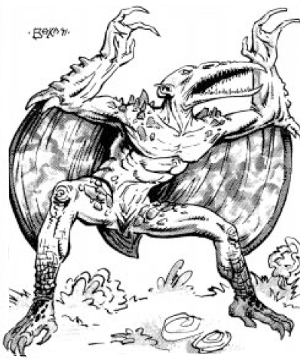

MC Forgotten Realms Appendix II

| Harrier | Larva | |
|---|---|---|
| Harassier | Larve | |
| Climate/Terrain: | Jungle | Jungle |
| Frequency: | Very rare | Very rare |
| Organization: | Solitary | Nest |
| Activity Cycle: | Night | Night |
| Diet: | Carnivore (carrion) | Carnivore (carrion) |
| Intelligence: | Low (5-7) | Non (0) |
| Treasure: | Nil | Nil |
| Alignment: | Neutral evil | Evil |
| No. Appearing: | 1-2 | 2-5 |
| Armor Class: | 6 | 9 |
| Movement: | 3, gliding 12 | 1 |
| Hit Dice: | 7+7 | 1 |
| THAC0: | 13 | 19 |
| No. of Attacks: | 3 | 1 |
| Damage/Attack: | 2-5/2-5/2-12 | 1-6 |
| Special Attacks: | Poison, rear claws 2-5 each | Nil |
| Special Defenses: | Camouflage, spell immunity | Nil |
| Magic Resistance: | Nil | Nil |
| Size: | M (4’ long) | T (1-2’ long) |
| Morale: | Fanatic (18) | Fearless (20) |
| XP Value: | 4,000 | 35 |
Harriers appear basically humanoid. They have two arms, two legs, and one head. They have somewhat pointed ears, glowing red eyes, and vicious beaks with sharp needle-like teeth spaced around the edges. Their beaks and their leathery skin are mottled green in color. They have no hair.
A thin membrane stretches between arm and body, ending at the knee. Their hands and feet have sharp claws, which are used for climbing trees as well as for combat. Using their arm-membranes as rudimentary wings, harriers glide from treetops to attack their prey. These foul creatures fortunately inhabit only the hottest jungle environments.
Combat: When motionless and against a background of green jungle foliage, harriers blend in well. In this case, opponents receive a -2 penalty to surprise rolls. Harriers attack by swooping quickly toward opponents and using their claws and beak. A beak hit has a 25% chance to inject a burning poison. This poison causes an additional 2-12 points of damage for one round. The pain results in the victim attacking with a -2 penalty. While the poison is in effect, Dexterity adjustments to Armor Class no longer apply. A saving throw reduces the damage to half and eliminates most pain effects, reducing the victim’s attack penalty to -1. The effects of the poison last for 5-20 rounds after it is injected.
If a harrier hits with both its front claws, it attaches itself to its victim, and brings its rear claws to bear. Each rear claw causes 2-5 points of damage with a successful hit. Once the harrier has attached itself to a victim, it becomes difficult to dislodge, requiring the victim to make a successful Strength check to do so. While attached, the harrier automatically causes 1-3 points of damage per front claw per round. It addition, it receives a +2 bonus to attacks when it uses its beak and rear claws on a victim to which it is attached.
Dislodging the creature causes 2-5 points of damage per front claw. This damage applies even after the creature is killed, unless the victim spends one full round to remove each claw.
A harrier is immune to heat and fire-based spells.
Habitat/Society: Harriers have no formal society, meeting only for short periods for courtship rituals and mating. A female harrier lays 2-8 eggs about three weeks after mating. She digs shallow pits for nests, dividing the eggs into two or three groups located several feet apart. Predators, including adult harriers, prevent most of the eggs from hatching into larvae. A month after the eggs are laid, 2-5 larvae hatch and begin to forage on their own. Only 1-2 live to mature into harriers.
Ecology: The harrier is a vicious predator that attacks any living animal it sees, including large and aggressive creatures such as dragons. When live prey is scarce, they scavenge for food, eating any type of carrion, including their own dead. They have no natural predators, but have several enemies in the jungle.
A harrier egg could bring up to 1,000 gold pieces from the right buyer. A young harrier can be trained to recognize a master who feeds it during its larval stage. To fully train the creature and become recognizable to it, the master must spend at least an hour each day with the creature as it matures. Because parental care is not natural for the harrier, however, a harrier cannot be trained to do anything except recognize its master. Even then, the harrier is dangerous and somewhat unpredictable. Once it has been placed somewhere as a guard animal, it guards that area to its death.
Harrier larvae are small, worm-like creatures with a transluscent, mottled brown skin. They hatch with a welldeveloped, toothless beak, which grows and develops as the larva does. A nearly mature larva has limbs and other organs visible just under its skin. The larva matures rapidly if enough food is available, shedding its skin after two months and emerging as a small, but fully-developed harrier.
